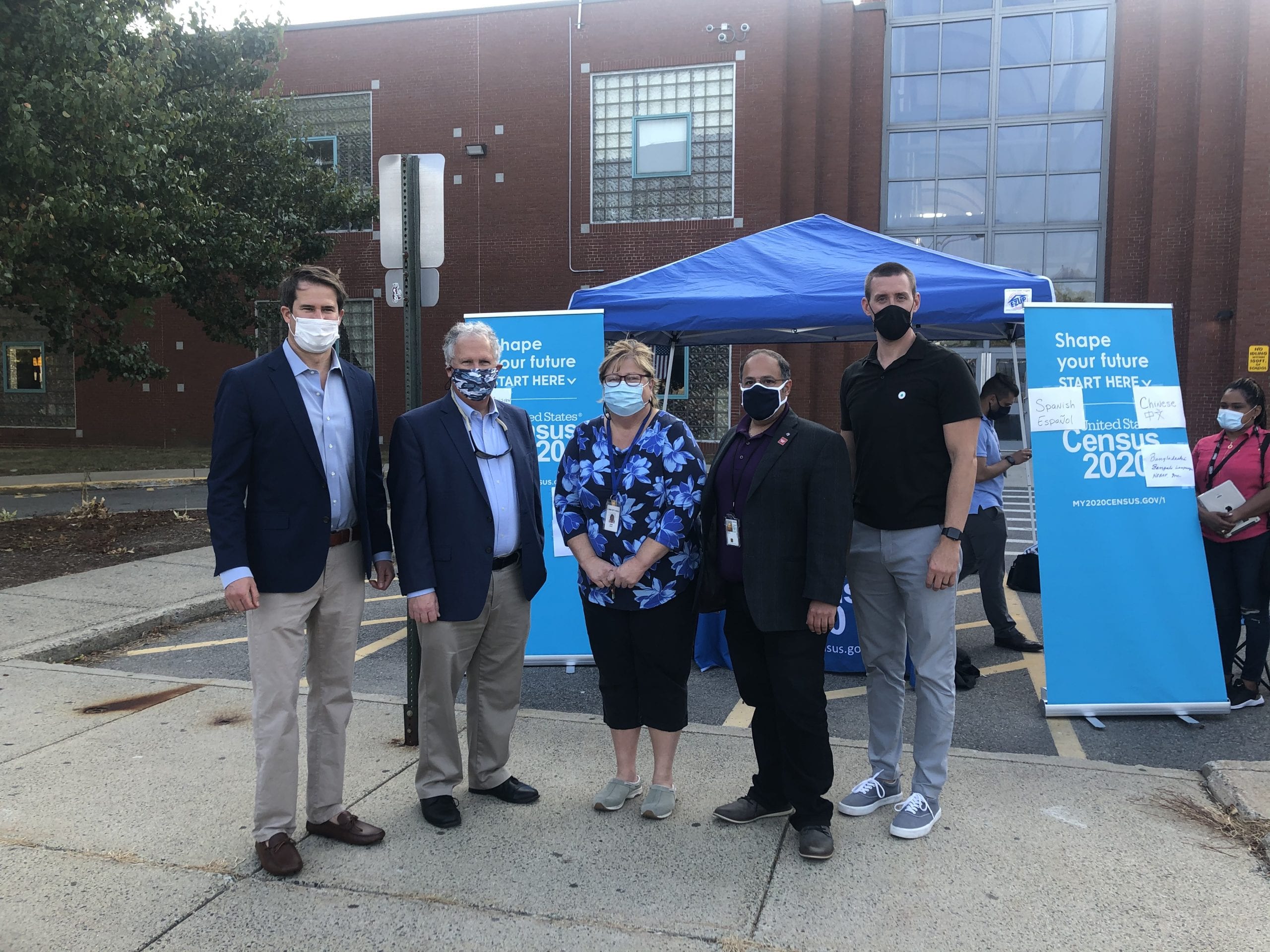LYNN — Lynn gave its “final push” to increase its 2020 Census response during an outdoor event Friday evening.
Residents were encouraged to come to the three-hour event at the Lynn Tech annex building, where census representatives were on hand to help them fill out their forms.
Before citizens started trickling in, a brief press conference, featuring remarks from Mayor Thomas M. McGee, U.S. Rep. Seth Moulton, and state Rep. Daniel Cahill (D-Lynn), was held in front of the sign-up booth that had been set up in the school building’s parking lot.
“This is another chance to both highlight the importance of the census and to have people come down and fill out the census,” said McGee.
The Mobile Questionnaire Assistance (MQA) event capped the city’s aggressive last push for the census that was demonstrated over the course of this past week. At least 20 similar pop-up events were held throughout Lynn this week.
By the end of the month, Lynn will have held more than 100 pop-up events, and there could be another 100 more if a federal judge’s Thursday ruling to extend the census deadline from Sept. 30 to Oct. 31 stands, according to City Clerk Janet Rowe.
Rowe said she hopes the White House doesn’t veto the decision (President Donald Trump is appealing the ruling), as the additional time will allow the city to increase its response rate for the 2020 Census.
As of Friday, 63.8 percent of Lynn residents have responded to the census, Rowe said, which is comparable to the state’s overall numbers. Sixty-eight percent of Massachusetts residents have responded, she said.
Much of the focus of Friday’s event was targeting the “hard to count” residents and areas of the city, which have traditionally had a low response rate, said Lilian Romero, chief program officer of LEO, Inc.
Romero said LEO, the city, school department and other community partners have been focused on increasing response in five census tracts, which have a high concentration of low-income residents and immigrants.
Romero credits outreach efforts with increasing response rates to more than 50 percent in four of five of those targeted census tracts, which is a slight bump from their 2010 rates. But she said one tract, which encompasses the lower Highlands, still remains below that desired threshold.
“We were trying to reach 60 percent for the city overall and specifically for those areas we were talking about, we were trying to hit over 50 percent,” said Romero, noting that even a slight bump in those “hard to count” census tracts is a huge improvement.
“If we had not done any of this work, we would not have reached the percentage we have reached in those hard to reach areas,” she said. “We were very committed to making sure we count every single person we can.”
Part of the work has been focused on gaining people’s trust, added Rowe, explaining that translators were on hand at Friday’s event to interact more easily with people.
The personal information of everyone who responds to the census is protected, Cahill said, noting that it was safe to respond as only statistics, not identifying information is shared.
Federal laws protect census confidentiality. It’s illegal for the census bureau to disclose responses in a way that would identify an individual, or for data collected by the census to be used for any non-statistical purpose, such as immigration regulation or other law enforcement, according to a document prepared by the Brennan Center for Justice.
“Counting every person is so important,” said Cahill. “The funding that Lynn alone will derive from this is so important.”
Much of the city and state push has been focused on that funding component, as communities could miss out on $2,400 of federal funding for each person who is not counted. That could leave low-income cities like Lynn, which has a high immigrant population, at risk of being underfunded.
Moulton cited the census’ importance, saying that it helps him and other lawmakers get a better understanding of the people they represent, and in turn, better serve those citizens by securing the proper funds.
That’s critical at a time where the president is “deliberately” trying to abuse the census process, Moulton said, citing the Trump administration’s attempts to exert unprecedented political influence over the census survey in ways that his critics say will give Republicans an advantage in upcoming political elections, as reported by CNN.
In addition to determining how federal funding is parceled out to states and municipalities, the census is used to allocate seats in Congress.
“(The) census is not political by nature, but we have a president who politicizes this,” said Moulton.
Mandated by the U.S. Constitution, the census is conducted every 10 years. If the federal ruling stands, the deadline for reporting census totals to the president will be extended from Dec. 31 to April 2021.
“I think the important thing is to continue to send the message: we still have time. Get involved and get counted,” said McGee.

